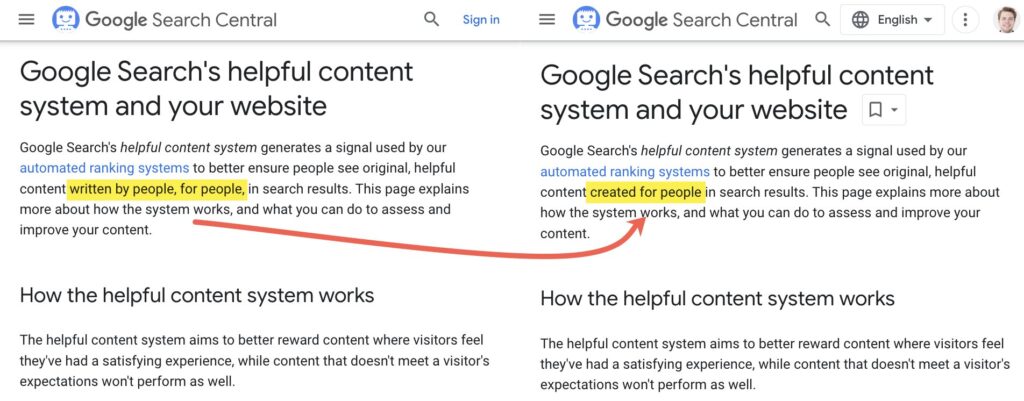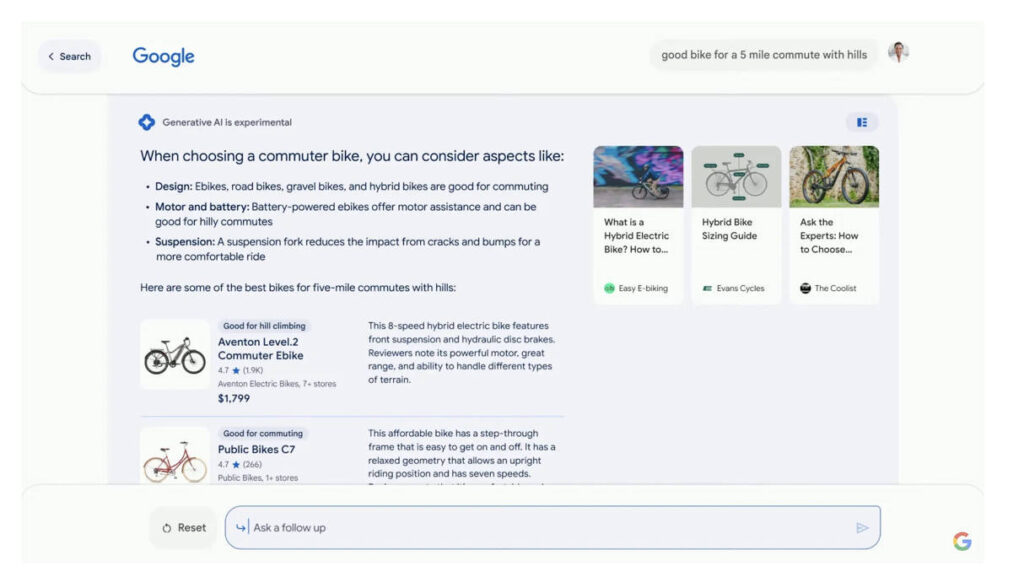In the early days of the internet, Google won the search engine wars against companies like AltaVista by developing more sophisticated algorithms rather than solely focusing on keyword matching. For example, Google’s PageRank algorithm incorporated authority, relevance, and keywords.
Since that time, Google has continued to provide search results based on user experience and search intent. At the same time, SEO strategists have continued to try to predict what the algorithm wants and create content that “hacks” the algorithm without violating Google’s guidelines.
In response to ChatGPT’s meteoric adoption rate, Google has significantly updated its algorithm and content guidelines in 2022 and 2023.

ChatGPT presents the first serious threat to Google’s dominance in many years. Google has been scrambling to adjust to the tidal wave of AI content that is just beginning to build. Google also recognizes that if users can get direct answers from a ChatGPT query, why would they still use Google?
Like most technology earthquakes, the first big jolt has seen sharp aftershocks, such as copyright infringement lawsuits and questions about AI ethics. Predictions of Google’s demise are premature. The company is already responding to marketers about what generative AI means for content, SEO, and website traffic optimization.
As AI transforms content creation strategies, CMOs want to leverage AI to meet Google’s standards. AI will continue to improve, but it’s still unable to do all the heavy lifting of a good marketing strategy. For content production, human supervision of AI content is vital.
Google’s stance on quality content has stayed the same even with AI. Before AI, they punished keyword stuffing and other attempts to manipulate searches at the expense of quality information and user experience. In the AI era, they will do the same.
Google continues to seek meaningful, informative, and engaging material that resonates with a target audience, whether the author is a human or a bot.
Let’s take a look.
Google’s Algorithm Adjustments and Current Content Guidance
With some algorithm updates, Google releases additional content guidance. Google’s September 2023 Helpful Content Update modified its AI and third-party content guidelines.
The update supports AI-generated content and emphasizes quality and user-centricity by removing “written by people.” Most experts interpreted this to mean Google would not penalize AI content simply because AI writes it. For Google, the main points are quality and user experience.

In Google’s view, helpful content should be high-quality. What do they mean by that? Let’s look at some additional content guidance.
E-E-A-T Content Framework
Google’s guidelines for evaluating quality content are known as the E-E-A-T framework. The acronym stands for Experience, Expertise, Authoritativeness, and Trustworthiness. While E-E-A-T is not an algorithm, it is an SEO fundamental because it influences how Google assesses and ranks content.
Content that conforms to the framework is more likely to rank higher. Here is a bit more detail about what each term means:
Experience: This evaluates the content creator’s experience and firsthand knowledge of the topic, ensuring the content uses practical, real-world understanding.
Expertise: Focuses on the content creator’s qualifications and knowledge in a specific field, particularly important for specialized or technical topics.
Authoritativeness: Measures the credibility and recognition of the content creator and the website in their field, assessed through credentials, external citations, and industry recognition.
Trustworthiness: Relates to the reliability and accuracy of the content and the website, ensuring the information is truthful, transparent, and dependable. Consistent posting also increases the trustworthiness score.
The E-E-A-T framework is essential for Your Money or Your Life (YMYL) topics, where accurate and reliable information is crucial. It guides content creators in producing high-quality content that Google’s search algorithms favor.
You can refer to Google’s guidelines on E-E-A-T for a detailed understanding.
Hidden Gems
In November 2023, Google announced its “Hidden Gems” algorithm and ranking, separate from the Helpful Content algorithm. Hidden Gems aims to promote content based on personal insights, experiences, or deep expertise from forum posts, social media, and blog posts.
Content Dont’s, According to Google
Finally, sometimes it’s easiest to know what to do by looking at what not to do. Google has clear guidelines on what qualifies as unhelpful content, whether the creators use AI or not. The overall situation Google is trying to avoid is rewarding a tidal wave of unhelpful content because AI makes it easier to produce it. The following list includes types of content to avoid.
- Search engine-first content focused on keywords
- Content with little to low-added value
- Content repeating what other sources have already said
- Content that makes false promises
- Publishing content only on trending topics
- Repetitive content to meet a specific word count
How Google’s AI Changes Affect SEO
When you consistently produce high-quality E-E-A-T content, that makes Google’s algorithm happy. Will your website traffic likely increase?
Unfortunately, there is no guarantee. As you know, in the past, Google would offer up links to ranked content in response to a query. The user then would click through to the content source to gather more information.
In response to losing users to ChatGPT’s conversational searching style, Google is developing its own generative AI results format. They are changing the user experience on the search page. It’s like a search workspace, where users can get complete answers to their questions (with citations) and ask follow-up questions.

Image source: TechCrunch and Google
This new functionality likely means more users will get the answers they need directly from the Google page, resulting in lower click-through rates to source material (like websites).
Optimize Landing Pages – Job One for Maintaining Conversion Rates
With the risk of lower traffic due to Google’s on-page search changes, optimizing your website content and landing pages is more important than ever to increase visitors’ conversion.
The good news is that AI can be your friend in improving your site’s on-page experience and conversions. AI can personalize the visitor’s experience in engaging ways and simplify scaling A/B testing for dozens of landing pages. If you need help figuring out where to start, FunnelEnvy can help.
AI Integration SEO Strategies
Besides optimizing landing pages, consider developing a plan to create more search-friendly content. Given the changing dynamics of search, here are some tips for search-friendly content that improve the odds of traffic coming to your site:
- Optimize your content brief and outline for SEO before you use AI. Then, edit the AI-generated content with original thought and research, brand voice, anecdotes, and expert insights.
- Keywords are still your friend; just don’t overuse them. Use the keyword phrase in the title, the first 100 words, and one header.
- User experience is very important to Google. Format your post for easy reading and indexing. Use headers and bold emphasis. The post should have a logical flow. One of the telltale signs of a poorly edited AI article is that it is hard to follow.
- Use internal and external links.
- Create comprehensive content so users won’t click away to find more info elsewhere.
- Content should be concise and not repetitive. Avoid passive verb tense.
- Always check AI content for accuracy. Editors and SMEs can fact-check and improve AI-generated content.
You can check out SemRush’s Content Marketing Guide for more in-depth suggestions.
Moving Ahead with AI-Generated Content for Google
You are not alone if you feel overwhelmed with all the changes from AI’s transformation of SEO and content marketing. The good news is Google’s fundamental stance on quality content has not changed, even with the advent of AI. Level up your content with E-E-A-T, and focus on optimizing your landing pages. If you have questions about a strategy for maintaining search and conversion results amid the changes, reach out for a call today; we can help.







